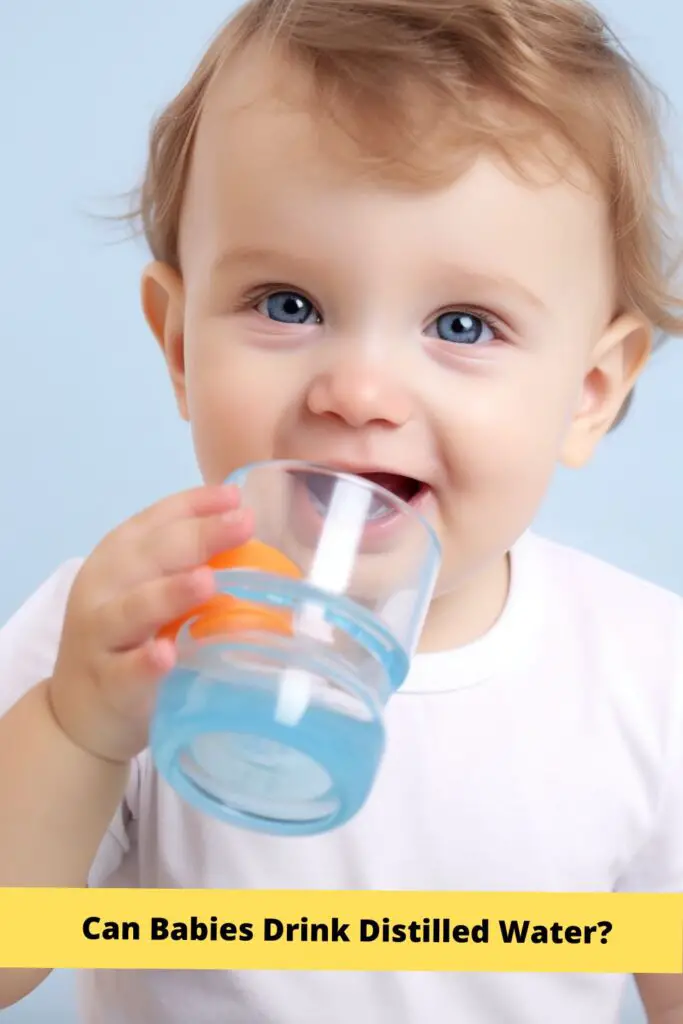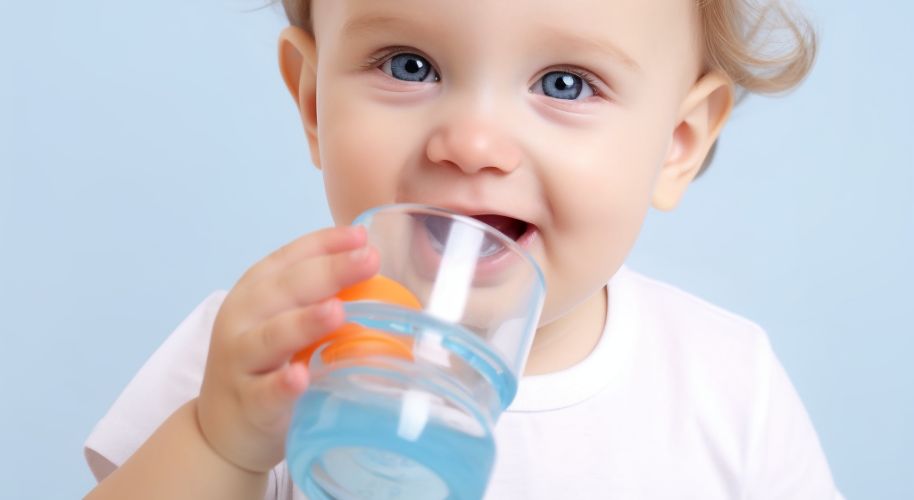Last Updated on August 21, 2023
When it comes to the health and well-being of our little ones, every decision can feel significant – even down to the type of water we give them. A commonly asked question is, “Can babies drink distilled water?” The answer is yes but with some qualifications.
Distilled water is safe for babies to drink as it’s purified from all bacteria, making it a good choice for mixing with baby formula. However, it lacks essential minerals, as distillation removes these impurities. It’s also important to note that babies under six months old should refrain from directly consuming water.
This brief introduction delves into the ongoing debate surrounding using distilled water for infants to ensure optimal well-being.

Can Babies Drink Distilled Water: What They Say
Pediatricians and experts emphasize the significance of balanced hydration and recommend breast milk or formula as the primary source of nourishment for newborns. In relation to this matter, we’ve consulted an inquiry to address providing distilled water to infants.
“Yes. Distilled water is safe for babies to drink. Because the fluoride has been removed from distilled water, your doctor might recommend giving…” – As mentioned on WaterSmart Systems.
“Pediatricians highly recommend distilled water. It undergoes a process removing a large majority of contaminants before it is up for …” – As per Tyent USA.
Using vapor-distilled water for babies when making baby formula ensures the purest and safest end product (source: Aquapap).
“Experts recommend distilled water as a safer source of water for infants below 1 year old.” – As stated on BabyDotDot.
“It’s also safe to use bottled water or distilled water. For higher-risk infants, such as babies under three months of age, premature infants or …” – Quoted from Babylist.
Distilled Water for Infants: Exploring the Safety
When it comes to the health and safety of infants, distilled water is often recommended for a variety of reasons:
Elimination of Contaminants
Distilled water goes through a purification process that removes bacteria, viruses, and harmful minerals. This makes it a safe choice for babies particularly vulnerable to these contaminants.
Recommended for Formula Preparation
Doctors suggest using distilled water when preparing baby formula. The formula already contains the necessary minerals for an infant’s growth, making distilled water a safe and suitable choice.
Suitable for Older Infants
Once your baby is over 6 months old, giving them tap water to drink is generally safe. However, it’s still advisable to use cooled distilled water when preparing their formula.
Safe for Undeveloped Immune Systems
Infants have yet to fully develop their immune systems, making them more susceptible to infections. Using distilled water, free from potentially harmful substances, is a safer option for their delicate systems.
Useful in Areas with Unsafe Water Supply
Distilled water is a reliable alternative for infants when tap water may be contaminated or unsafe for drinking.
You Might also Like These Resources!
Things to Know About Distilled Water for Babies

Here are some important things to know about giving distilled water to babies:
- Purity and Contaminants: Distilled water is purified through boiling and condensation, eliminating impurities and contaminants. It is free from minerals, bacteria, and pollutants.
- Mineral Balance: While purity is advantageous, lacking minerals in distilled water can impact an infant’s electrolyte balance and overall nutritional needs. Essential minerals are crucial for their growth and development.
- Breast Milk or Formula: Pediatricians recommend breast milk or formula as the primary source of hydration and nutrition for babies. These options provide nutrients, including minerals, tailored to an infant’s requirements.
- Risk of Dilution: Offering distilled water instead of breast milk or formula might inadvertently dilute a baby’s nutrient intake, potentially affecting weight gain and development.
- Digestive System Sensitivity: Babies’ digestive systems are delicate and might not handle the lack of minerals in distilled water well, possibly leading to gastrointestinal issues.
- Consult a Pediatrician: Before introducing any new form of hydration, it’s crucial to consult a pediatrician. They can provide personalized guidance based on the baby’s needs and health status.
- Hydration Balance: Babies generally receive adequate hydration through breast milk or formula. Extra water is only sometimes necessary, especially during the first few months of life.
- Transition to Solids: As babies consume solid foods, their hydration needs may change. Consult a healthcare professional to determine if and when additional water might be appropriate.
The Right Way to Give Distilled Water to Babies
One common question among parents is using distilled water for babies, especially in formula preparation. Here’s a step-by-step guide on how to correctly use distilled water for your infant’s needs.
Step 1: Hand and Bottle Cleaning
Start by washing your hands thoroughly with soap and water. Clean the baby bottle and all its accessories to ensure they are free from contaminants.
Step 2: Boiling the Bottle
To further sterilize the bottle, boil it and its accessories in water for about five minutes. Alternatively, you can use a microwave steam sterilizer bag or a stand-alone electric steam sterilizer.
Step 3: Preparing the Water
If your baby is less than six months old, it’s recommended to boil the distilled water and let it cool for about 5 minutes. For babies over six months, you can use distilled water as is.
Step 4: Mixing the Formula
Based on the instructions provided on the formula package, add the appropriate amount of formula to the clean, cooled bottle.
Step 5: Adding the Water
Pour the prepared distilled water into the bottle over the formula. Ensure that the water level is correct according to the formula instructions.
Step 6: Shake Well
Secure the bottle lid and shake well until the formula is completely dissolved.
Step 7: Serve Immediately
Serve the formula immediately to ensure its freshness. If there’s any leftover formula, discard it to prevent bacterial growth.
Step 8: Storing Properly Never freeze the prepared formula; instead, store it in the refrigerator if not used immediately. It should be used within 24 hours.
Best Brands of Distilled Water for Babies
Choosing the right distilled water for your baby is crucial for their health and development. Here are the top distilled water brands designed for your little one’s needs.
Bay Bay Water
Bay Bay Water is a brand specifically designed for babies. This purified water undergoes a stringent distillation process, making it safe and suitable for mixing with baby formula or cereals.
Parent’s Choice Water
Parent’s Choice is a well-known brand for baby products, including distilled water. Their water is steam-distilled and goes through rigorous purification procedures to ensure its suitability for babies.
Poland Spring Water
Poland Spring offers natural spring water that is carefully sourced and packaged. While not technically distilled, it’s filtered and treated to ensure its safety for all consumers, including babies.
Zephyrhills Water
Zephyrhills is a popular brand offering 100% natural spring water. It’s processed through several filtration stages, making it a safe choice for your baby.
Snugell Water
Snugell Water is another brand providing distilled water ideal for babies. The water undergoes a meticulous distillation process to remove impurities and contaminants.
Smartwater Vapor Distilled Water
Smartwater is a vapor-distilled brand that also adds electrolytes for taste. It’s a premium choice known for its purity and clean taste, making it suitable for use in baby formula.
FAQs
How is distilled water different from regular tap water or bottled water?
Distilled water undergoes distillation, which involves boiling and collecting the steam, which is then condensed into the water. This process removes impurities and minerals. Regular tap or bottled water may contain these minerals and other additives like fluoride.
Should You Give Purified or Distilled Water to Your Baby?
Whether to give purified or distilled water to your baby largely depends on the water quality in your area. Both are free from impurities, but distilled water lacks minerals. Always consult with a healthcare professional for personalized advice.
Is it necessary to boil distilled water before giving it to a baby?
Billing distilled water before giving it to a baby is unnecessary as the distillation process already eliminates harmful bacteria and impurities. However, boiling might be advisable if the bottle or container storing the water isn’t sterilized.
Can I use distilled water to clean baby bottles and pacifiers?
Yes, you can use distilled water to clean baby bottles and pacifiers. It’s free from impurities that could stick to these items during washing, ensuring a cleaner result.
Wrapping Up
In wrapping up, giving babies distilled water is like having a super clean slate, but it might not be the best color for their development masterpiece. Distilled water, all squeaky clean, lacks the special vitamins and minerals that little ones need to build their tiny empires – those strong bones and teeth.
Using a bit of distilled water for babies can be okay. It’s super clean and good for cleaning their stuff or mixing formulas. But don’t go overboard – babies need special milk or formula to grow strong. A doctor’s advice is like a safety net, ensuring you’re on the right track. While a little distilled water here and there might not hurt, remember that the real power comes from the milk and formula that give babies what they need to grow healthy and strong.
You Might Also Like These Latest Content!
- When Your Baby Has Outgrown the Bassinet but Isn’t Ready for a Crib
- Determining When a Child is Too Old for a Playpen
- Does a Cool Mist Humidifier Make the Room Feel Cold?

Dr. Leah Alexander is a board-certified general pediatrician who has been in practice for over 20 years. She began working as a pediatrician at Elizabeth Pediatric Group of New Jersey in 2000. Since 2005, she has been working as an independently contracted pediatrician with Medical Doctors Associates at Pediatricare Associates of New Jersey. Read more
